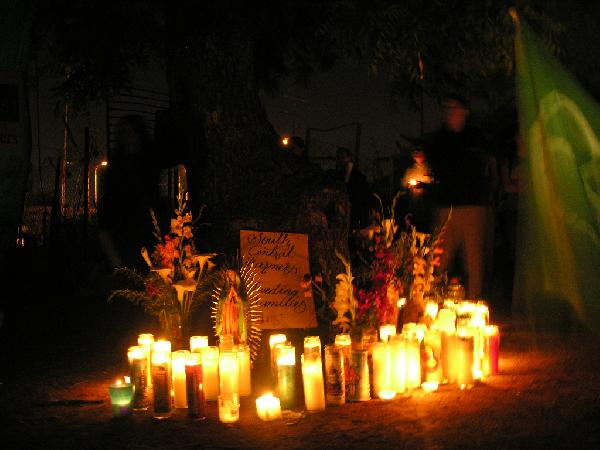by Juan Santos
Saturday, May. 27, 2006 at 1:51 AM
She thinks, “This is all we need: Land and community. It doesn’t matter what we believe, or what our differences are; if we can listen, the land itself will teach us what we need to know.”

farm_altar_by_marcus.jpg, image/jpeg, 600x450
At the base of the tree, on an altar of dust, blaze some 100 veladoras, glass encased devotional candles with images of La Guadalupe, La Reina de Las Americas, of the santos and of Jesus; of a Mexica woman, half flesh / half skeleton, giving birth to life and death.
A basket of dried kernels of maiz is placed near a set of handprints in the dust. The scent of sage swirls in the air, a man sings softly in Nahuatl, his drum throbbing quietly, a child beside him. In the dust, Black man kneels his forehead to the Earth; a Chicano man smudges him; he cups the smoke to his heart. The brown man presses a kernel of corn into his palm; the black man encloses it in prayer. In the dust, a half melted candle has tipped and fallen, its wax spilling over and capturing a leaf at its tip like a new flame, a green flame of life, of chlorophyll and fire, a new synthesis of earth, hope and living things.
A woman, also Black, comes and re-lights all the candles that have gone out. Every veladora that can burn is ablaze.
A young Chicana says she doesn’t know if there are warrants out for her or not, but her circle of danzantes has prayed, encircling her, and she knows in her heart what she must do, and that no matter what happens, she is safe.
A white woman calls her friend on her cell: she has an obligation tomorrow to lead a circle of lesbian artists. Should she stay? Can she abandon them; they have only so much time to prepare for what they will be doing; can she go to jail today - on this day - when so many are counting on her? Before the night is over she will slip into her tent for a few hours of sleep: the morning brings what it will.
A man stands agitated on the sidewalk; he is needed here, he says, he cannot let people down; he is a refugee, seeking political asylum. If they arrest him he will be deported – rendered – tortured, probably killed. He cannot decide.
In the darkness, tables, chairs, garbage cans and sawhorses have been strewn to block the pathways between the garden plots of the South Central Farm. A woman and a man sit in a tree, vowing not to return to the Earth until this place is free. At night they are all but invisible through the leaves.
Outside the fence they keep vigil, the patrols with their two way radios and la bisabuela – a great-grandmother in an old kitchen chair on the sidewalk. She sings, while a young woman strums her small guitar. La abuelita, hair all white and grey, tells the young woman next to her, “With God we can do this: with God we are strong.”
All night there are rumors. Something is about to change.
“Go out and do what you can tonight, we need people to come at night and celebrate. We’ll talk, we’ll have food. Sunday we’ll have music. Now we are here, inside the fence, we have done all we can do” says a Farm leader. “We are here,” he says, meaning here, under siege.
And so I have written this:
We are here, and alive.
We belong to this land, all of us who come here to touch it are touched by it, and we are claimed by it, together.

